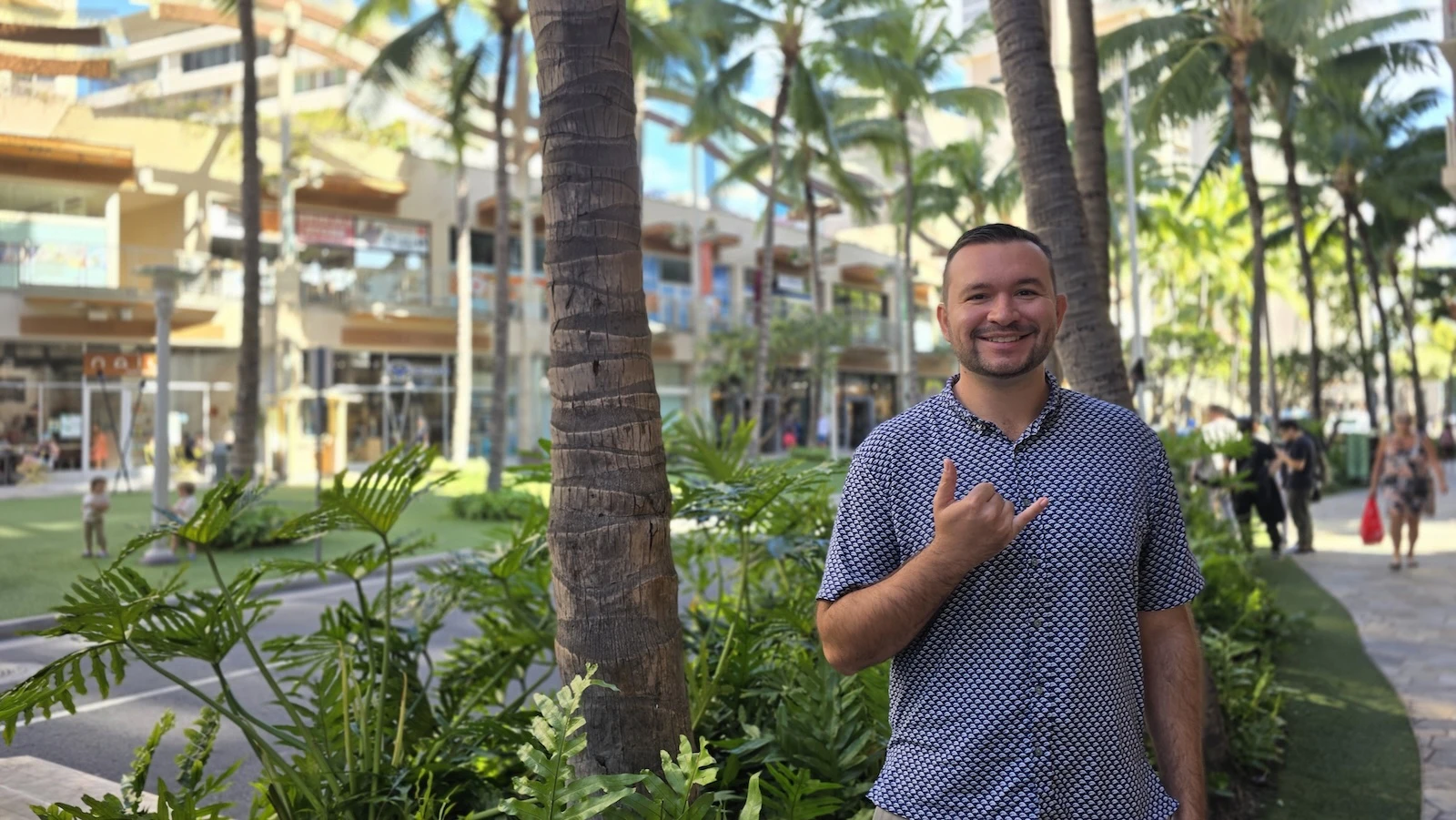Trevor Abarzua, president and executive director of the Waikīkī Business Improvement District, says the nonprofit's mission is a "clean and safe Waikīkī."
According to its website, the organization was founded in 2000 "to help supplement city services." Abarzua told Aloha State Daily that it is largely funded by tax assessments on commercial properties within the district.
Part of WBID's efforts to keep Waikīkī clean and safe include the Aloha Ambassador Program, Safe & Sound Waikīkī, houseless and mental health outreach and disaster preparedness training, its website notes.
Even though the nonprofit has "business" in its, name, Abarzua says he feels it's more of a "community benefit organization."
"I think there's a misconception that we're just helping businesses out," he said. "Actually, we're beautifying the community and we're really making Waikīkī a better place for everyone, including residents."
ASD recently spoke with Abarzua about WBID's plans for 2025 and more. Here are some of the highlights from that conversation:
On 2025 ...
Looking to the year ahead, Abarzua first takes a look back.
WBID, he said, was previously able to "really invest" in its work to address homelessness with a partnership with the Institute for Human Services.
But as part of a new partnership with Waikīkī Health, Abarzua says a street medicine doctor from that organization walks around the community, along with an Aloha Ambassador outreach worker and IHS workers. They aim to get homeless individuals medication, signed up for insurance and into the Waikīkī Health system — and hopefully into shelters, he told ASD.
Through these partnerships, and since the Safe & Sound program launched in September 2022, Abarzua said there's been a 27% reduction in homelessness within the Waikīkī District, "which we're very proud of, and we think we'll continue to see that reduction in our next [homeless] count that we do with the University of Hawai‘i." Abarzua says these counts are done twice a year and the next one will be done in the spring.
Also in 2025, Abarzua said the organization is working on plans for an "elevated" safety program that will help strengthen the safety presence in the community. Abarzua said there will be at least two full-time "elevated" safety ambassadors hired under the Aloha Ambassador program. These positions are expected to start in the summer.
They will provide coverage from 6 a.m. to 11:30 p.m. seven days a week, year-round, he said, and WBID also will invest in body cameras for those individuals.
On challenges and accomplishments since stepping into his role nearly two years ago ...
For Abarzua, the biggest challenge has been "sometimes finding problems to solve," he says. "It's kind of a funny thing to say that, but I think Waikīkī in general, when I took the job, was in a great place."
Crime was going down, homelessness was starting to decline and people knew it as a brand, he says.
"It's a beautiful place. It's a great community to live. But we were coming out of Covid, so I think when I took the role, I just kind of wanted to pour gas on the fire of the initiatives we were already doing," Abarzua said. "How can we be more efficient? How can we get the word out there. Then also, how we could bring in more funding or more resources to the programs we're doing."
He's most proud of the work the organization is doing to address homelessness and says that the 27% reduction in the homeless rate in two years is "phenomenal."
"But I think the second thing I would say I'm proud of is just the way that we've been able to go out there and get more resources for programs," Abarzua says. "Whether it's private donations for things — like we got a private donation for new trash cans at Kūhiō Beach park from a company that doesn't pay into our organization. Whether it was grants — we got a $200,000 Grant-in-Aid from the state of Hawai‘i Legislature (and) other grants from the City and County, from the Mayor's Office. I think before I took the role, we never really went outside that scope of bringing in more resources — we always just stuck to the assessment money that we received and that's the budget we stayed in. But I wanted to do more and, again, put that gas on the fire of things that we're doing — have more staff out there, do more projects, more initiatives to make Waikīkī even better.
On improvements in Waikīkī since he took the helm of WBID ...
From a cleanliness standpoint, Abarzua said "it's always about the eye test" when you walk down the street.
"I could rattle off stats and tell you how much homelessness is reduced, how much crime is reduced, but I think what I'm most proud of is when people that have lived here for their whole lives and haven't come to Waikīkī in maybe three, four or five years, or maybe before Covid, and they remember a Waikīkī that was a lot different," he told ASD. "They come now and they call me or they call Solomon (Kaimimoku, general manager of the Aloha Ambassador program) and say, 'Oh my gosh. It's so nice down there now.'"
As a brand, Abarzua said from a tourism perspective, Waikīkī is still recovering from the Covid-19 pandemic. In response to the pandemic in early 2020, policymakers restricted travel to the Islands, and within the state.
"We do want more visitors to come, so I think us being part of that equation of being a destination management organization and making sure Waikīkī is clean, making sure it's safe, making sure it's hospitable — we're glad we're doing our part."
Stephanie Salmons can be reached at stephanie@alohastatedaily.com.





